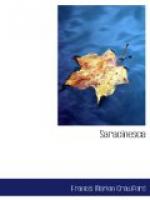“Nonsense, my dear boy! Nothing will happen to you—you will just run him through the arm and come home to breakfast.”
The old Prince spoke in his rough cheerful way; but his voice trembled, and he turned aside to hide two great tears that had fallen upon his dark cheeks and were losing themselves in his white beard.
CHAPTER XII.
Giovanni slept soundly for two hours. He was very tired with the many emotions of the night, and the arrangements for the meeting being completed, it seemed as though work were over and the pressure removed. It is said that men will sleep for hours when the trial is over and the sentence of death has been passed; and though it was more likely that Del Ferice would be killed than that Giovanni would be hurt, the latter felt not unlike a man who has been tried for his life. He had suffered in a couple of hours almost every emotion of which he was capable—his love for Corona, long controlled and choked down, had broken bounds at last, and found expression for itself; he had in a moment suffered the severest humiliation and the most sincere sorrow at her reproaches; he had known the fear of seeing her no more, and the sweetness of pardon from her own lips; he had found himself on a sudden in a frenzy of righteous wrath against Del Ferice, and a moment later he had been forced to hide his anger under a calm face; and at last, when the night was far spent, he had received the assurance that in less than four hours he would have ample opportunity for taking vengeance upon the cowardly eavesdropper who had so foully got possession of the one secret he held dear. Worn out with all he had suffered, and calm in the expectation of the morning’s struggle, Giovanni lay down upon his bed and slept.
Del Ferice, on the contrary, was very wakeful. He had an unpleasant sensation about his throat as though he had been hanged, and cut down before he was dead; and he suffered the unutterable mortification of knowing that, after a long and successful social career, he had been detected by his worst enemy in a piece of disgraceful villany. In the first place, Giovanni might kill him. Del Ferice was a very good fencer, but Saracinesca was stronger and more active; there was certainly considerable danger in the duel. On the other hand, if he survived, Giovanni had him in his power for the rest of his life, and there was no escape possible. He had been caught listening—caught in a flagrantly dishonest trick—and he well knew that if the matter had been brought before a jury of honour, he would have been declared incompetent to claim any satisfaction.




